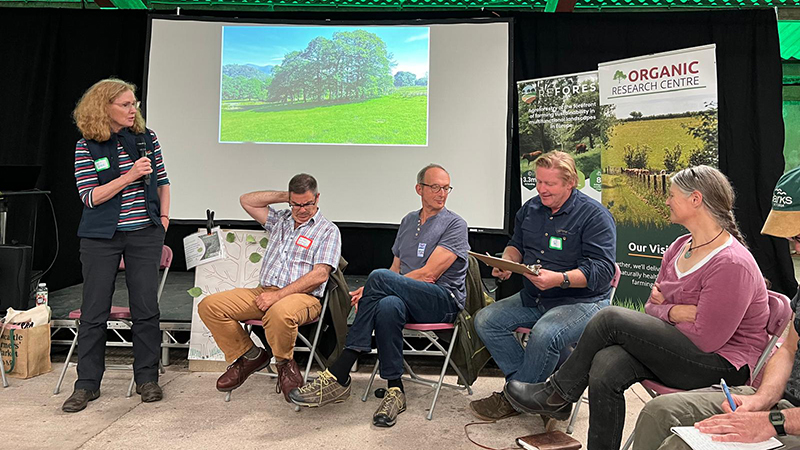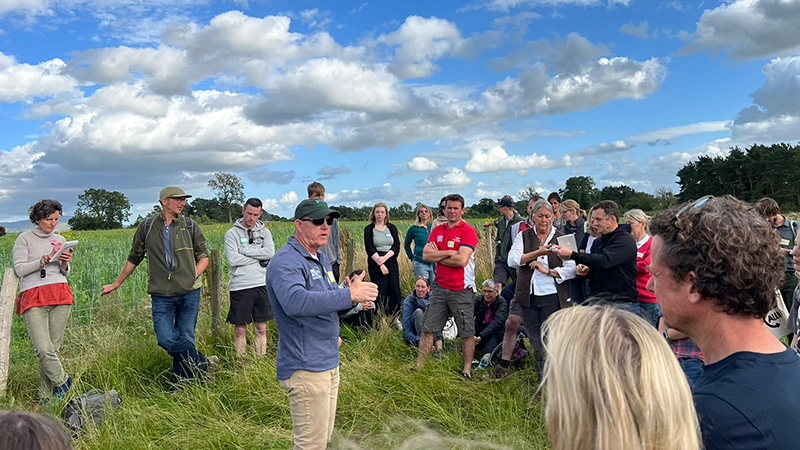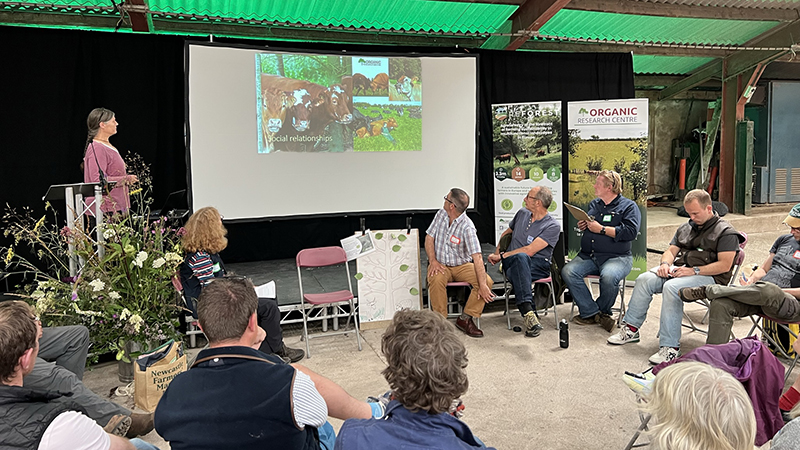Just back from an inspiring and energising weekend at Carbon Calling – as ever, the Carbon Calling team put together a thought-provoking and engaging programme presented in an innovative way. Not only was the information ‘regenerative’ but so was the delivery! The event kicked off with an unstructured Mock the Week meets Dragon’s Den style session, ably facilitated by Rob Yorke, an unaffiliated ‘environmental dialogue broker’. Groups of three people selected at short notice from the audience were invited to form a panel and make a brief statement, inviting responses from the crowd. Statements included direct questions to the audience, like Stuart Johnson’s ‘what is the best way to learn?’ – short answer – peer-led, and definitely not death by consultant! The panels rotated on and off the stage so that we heard from at least 15 different people within one session. Engaging, provocative, controversial and entertaining all at once.

My favourite panelist by far was Emily Grant who challenged the room to consider our cognitive biases when we engage with regenerative agriculture. First off, she introduced the Dunning-Kruger Effect, a genuine cognitive bias which she described as having our confidence in our ability and knowledge on a subject grow faster than our actual competence, or to put it another way “being ignorant of one’s own ignorance”. How many of us in our professional lives are confidently making statements as facts because we don’t know what we don’t know….? I definitely related to the second bias she described: desirability bias, which is simply a belief in something because we want it to be true! Aren’t we all desperately hoping that following the regen ag/organic pathway will deliver all the positive environmental and societal outcomes it promises?
Being conscious of our own biases set us up well for the headline speaker: Allen Williams. In that true evangelical American style we have become so familiar with at regen ag events, Williams first described the state of our environment and farming systems as a gloom and doom scenario, before presenting regen ag and Understanding Ag’s 6-3-4 approach as the path to salvation. 6-3-4 is a new framing of the regen ag doctrine that I wasn’t familiar with, so I was interested to hear it explained. The ‘6’ refers to the same six principles of soil health that most of us already know (minimise disturbance, armour the soil, living roots year-round, integrate livestock, diversity, and last but not least, context). The ‘3’ are three rules of adaptive stewardship: compounding (essentially the knock-on effects of a change in management that we need to observe and adapt to), disruption (recognising that nature is resilient and can recover from disruption) and diversity (again…). In the section on adaptive stewardship Williams made a point of emphasising that adaptive grazing is NOT mob grazing or total grazing or management-intensive gazing (MiG) or rotational grazing…arguing that grazing strategies should not be prescriptive or formulaic in nature. The ‘4’ refers to four ecosystem processes (energy cycle, water cycle, mineral cycle and…you guessed it…diversity again).
This new emphasis on ‘adaptive’ within the regen ag doctrine intrigued me, especially the part about disruption. Does this mean that the six principles of soil health are no longer applied rigidly? Would it be OK to plough once in a while? I asked Williams this very question after the lecture and was pleased to hear that it is absolutely fine if measures are taken to minimise damage and ensure the restoration of soil health after the disruption. At last! Organic farmers can call themselves regen, even if they are using the plough judiciously, which is certainly what we aspire to do. So organic is regen, but is regen organic??? Well…no…because the standards (and the Understanding Ag team have recently launched a certification scheme: Certified Regenified) for regen ag certification do not provide rules around use of external inputs as required in organic production systems. The Certified Regenified scheme very much focuses on the regen ag journey requiring reporting on implementation of actions/practices, rather than adherence to a strict set of rules. In this respect, it appeals to me and I’ll explore it further in comparison to organic certification schemes in a future blog.

After lunch we were offered the choice of joining a diverse range of workshops and activities including a field walk with Allen Williams, Tim Nicholson and Pete Leeson on a hedge walk, Chris Turner and Niels Corfield on soil health and water, and our own session on our REFOREST living labs and how to integrate livestock and trees in agricultural landscapes. The variety of workshops and activities reflected what was offered to the Carbon Calling team and thus even the afternoon programme was a result of a co-creation process with partners.

We wrapped up the weekend on Sunday morning with an optional and unstructured session bravely led by Liz Genever. The initial introduction round identified a wealth of skills and expertise in the room, as well as highlighting a couple of needs from the participants. Ras, a new farmer, wanted advice on how to design his 40 acre farm to meet a range of objectives, while Hannah and Anna from the Northumberland County Council were trying to learn how to better support farmers in the county in their transition to regenerative farming. These two groups set to work problem-solving and identifying actions and next steps for the two challenges. This part of the event was possibly the most ‘organic’ in how it developed and genuinely rewarding and fun!
Hats off to the Carbon Calling team (Liz, Nic and Paul Renison, and host, Tim Nicholson) for delivering such an engaging and entertaining programme of events. The food and drink was fab, there was lots of time for good “craic”, and I can’t wait to join in the fun and learning again next year!
